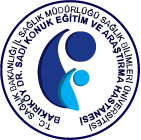ABSTRACT
Material and Methods:
The population of the present study, which was conducted retrospectively in department of pediatrics in our hospital, was 450 healthy full-term newborns who had been born by cesarean section during the period January 1, 2008 and April 30, 2008. All data were analyzed by using SPSS 15.0 . Correlation between total bilirubin and thyroid hormone levels was computed by the Pearson’s correlation coefficient.
Results:
The mean age of the neonates when discharged from the hospital after birth was 76±1.2 hours. The mean birth weight was 3306±432 g and the mean gestational age was 269±8 days (384/7±11/7 weeks). The mean serum levels of T4 and TSH in the neonates of the study group were 13,73±2,2 μg/dl and 6,96±3,97 mU/mL respectively. The mean serum level of total bilirubin in the study group was 8,95±3,23 mg/dl. The Pearson’s correlation analysis revealed that r was -0.19 between TSH and total bilirubin levels and was significant but not so much powerful.
Conclusion:
Our results suggest that simultaneously measurement of T4, TSH, and bilirubin levels is a useful clinical tool for screening but there seems to be no significant clinical correlation between these parameters in healthy term newborns.
Objective:
For the purpose of screening for congenital hypothyroidism and metabolic diseases blood is drawn for analysis from all newborns about 72 hours of postnatal age, which coincides with the approximate peak-time of bilirubin levels. Adding the measurement of serum bilirubin concentrations to the blood tests in programs of this kind will serve to detect high levels of bilirubin. The present study was designed to investigate a relationship, between neonatal TSH, T4 and total bilirubin levels in the blood samples of postnatal third day.



